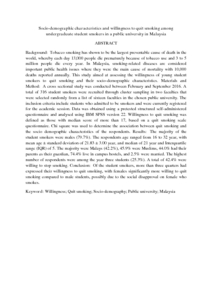Citation
J., Imandojemu Wilson and Abd Manaf , Rosliza and Ismail, Suriani
(2016)
Socio-demographic characteristics and willingness to quit smoking among undergraduate student smokers in a public university in Malaysia.
International Journal of Public Health and Clinical Sciences, 3 (5).
pp. 122-131.
ISSN 2289-7577
Abstract
Background: Tobacco smoking has shown to be the largest preventable cause of death in the world, whereby each day 13,000 people die prematurely because of tobacco use and 3 to 5 million people die every year. In Malaysia, smoking-related diseases are considered important public health issues where they were the main cause of mortality with 10,000 deaths reported annually. This study aimed at assessing the willingness of young student smokers to quit smoking and their socio-demographic characteristics. Materials and Method: A cross sectional study was conducted between February and September 2016. A total of 316 student smokers were recruited through cluster sampling in two faculties that were selected randomly from a list of sixteen faculties in the chosen public university. The inclusion criteria include students who admitted to be smokers and were currently registered for the academic session. Data was obtained using a pretested structured self-administered questionnaire and analysed using IBM SPSS version 22. Willingness to quit smoking was defined as those with median score of more than 17, based on a quit smoking scale questionnaire. Chi square was used to determine the association between quit smoking and the sociodemographic characteristics of the respondents. Results: The majority of the student smokers were males (79.7%). The respondents age ranged from 16 to 32 year, with mean age ± standard deviation of 21.83 ± 3.00 year, and median of 21 year and Interquartile range (IQR) of 5. The majority were Malays (42.2%), 45.9% were Muslims, 44.0% had their parents as their guardian, 74.4% live in campus hostels, and 2.5% were married. The highest number of respondents were among the year three students (25.3%). A total of 42.4% were willing to stop smoking. Conclusion: Of the student smokers, more than three quarters had expressed their willingness to quit smoking, with females significantly more willing to quit smoking compared to male students, possibly due to the social disapproval on female who smokes.
Download File
![[img]](http://psasir.upm.edu.my/53838/1.hassmallThumbnailVersion/Socio-demographic%20characteristics%20and%20willingness%20to%20quit%20smoking%20among.pdf)  Preview |
|
PDF
Socio-demographic characteristics and willingness to quit smoking among.pdf
Download (7kB)
| Preview
|
|
Additional Metadata
Actions (login required)
 |
View Item |

